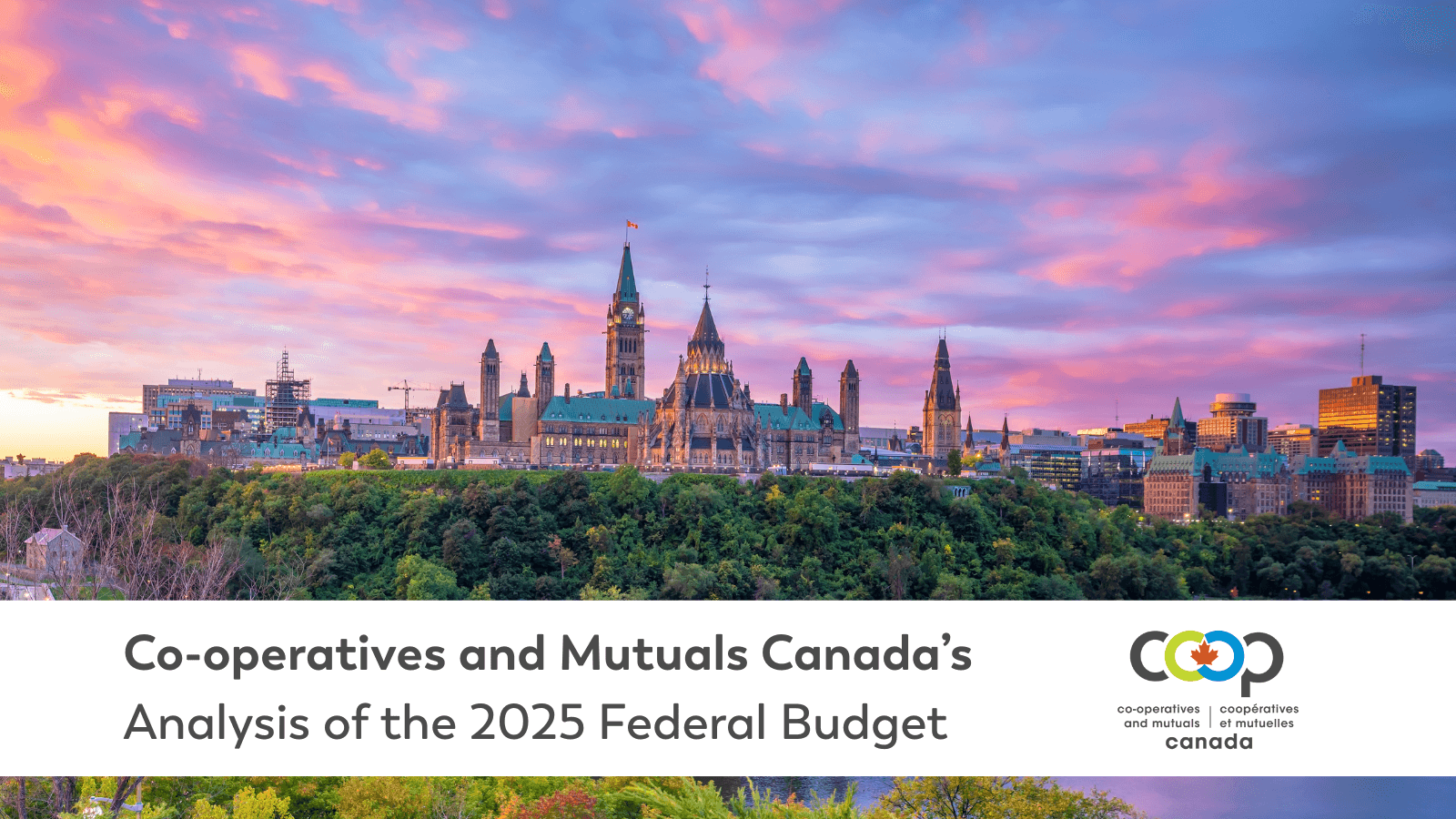On November 4, 2025, the Government of Canada released its federal budget, Canada Strong. Framed by global uncertainty, affordability challenges, and fiscal restraint, the plan focuses on investment-driven growth to strengthen Canada’s economy and build resilience.
For co-operatives and mutuals, the message is clear: community-owned solutions are more relevant than ever. As governments look for ways to balance fiscal discipline with social impact, the co-operative model stands out as a proven approach to inclusive growth and shared prosperity.
Co-operative Wins in Budget 2025
This year’s budget reflects several of CMC’s pre-budget recommendations, showing growing recognition of the co-operative model’s value to Canada’s economy and communities.
- Extension of the Tax-Deferred Co-operative Share (TDCS) Program
Renewed until 2030, this program helps agricultural co-ops reinvest in innovation and infrastructure. CMC welcomes the extension but continues to call for it to become permanent.
- Continued Support for Co-operative Housing
The budget reaffirms support for Build Canada Homes, recognizing co-ops as essential to affordable housing. It also includes $2.8 billion for Indigenous housing. However, CMC joins CHF in urging the government to renew the Federal Community Housing Initiative (FCHI) beyond 2028 to preserve mixed-income affordability in co-op housing.
- Capital-Gains Tax Exemption for Worker Co-operatives
Budget 2025 confirms the $10 million exemption on sales of businesses to worker co-operatives until December 2026. This measure helps retiring business owners transition their companies to their employees through worker co-ops. CMC joins CWCF in urging the government to make this measure permanent.
- Additional Wins
- The new Buy Canadian Policy expands opportunities for co-ops and social enterprises in federal procurement.
- Legislative changes supporting credit unions’ growth and entry into the federal framework
- Major investments in clean energy, infrastructure, and workforce development align with co-ops’ leadership in local, sustainable innovation.
- A continued focus on regional economic resilience mirrors co-operatives’ work in rural and northern communities.
Where More Action Is Needed
While Budget 2025 takes meaningful steps, important gaps remain:
- No dedicated investment tools to help co-ops access growth capital.
- No expanded access to the Small Business Deduction for co-ops.
- Limited clean-energy incentives for renewable-energy co-operatives.
- No new funding for social finance or co-operative development.
CMC will continue advocating for co-operative investment funds, inclusion of co-ops in clean-energy programs, and long-term funding for co-op development and social finance.
The Bigger Picture
The overall government spending for the 2025-2026 fiscal year is projected at $141 billion in new spending, offset by $51.2 billion in savings, amounting to a total net new spend of $89.7 billion. Fiscal projections show a deficit of $78.3 billion in 2025-2026. Organized around five chapters — Building a Stronger Economy, Shifting from Reliance to Resilience, Empowering Canadians, Protecting Sovereignty, and Modernizing Government — the budget signals a shift toward partnership-based growth.
Across these priorities, co-operatives and mutuals have a key role to play — delivering results that combine economic strength with community benefit.
Looking Ahead
As Canada pursues an investment-led recovery, co-operatives and mutuals are ready to partner — delivering local solutions that strengthen communities, create jobs, and keep prosperity rooted in Canadian hands.
CMC will continue to work with the federal government to ensure co-ops remain central to Canada’s inclusive and sustainable growth agenda.
Together, we can make Canada Strong also mean Communities Strong.
Read the full CMC Budget 2025 Analysis

